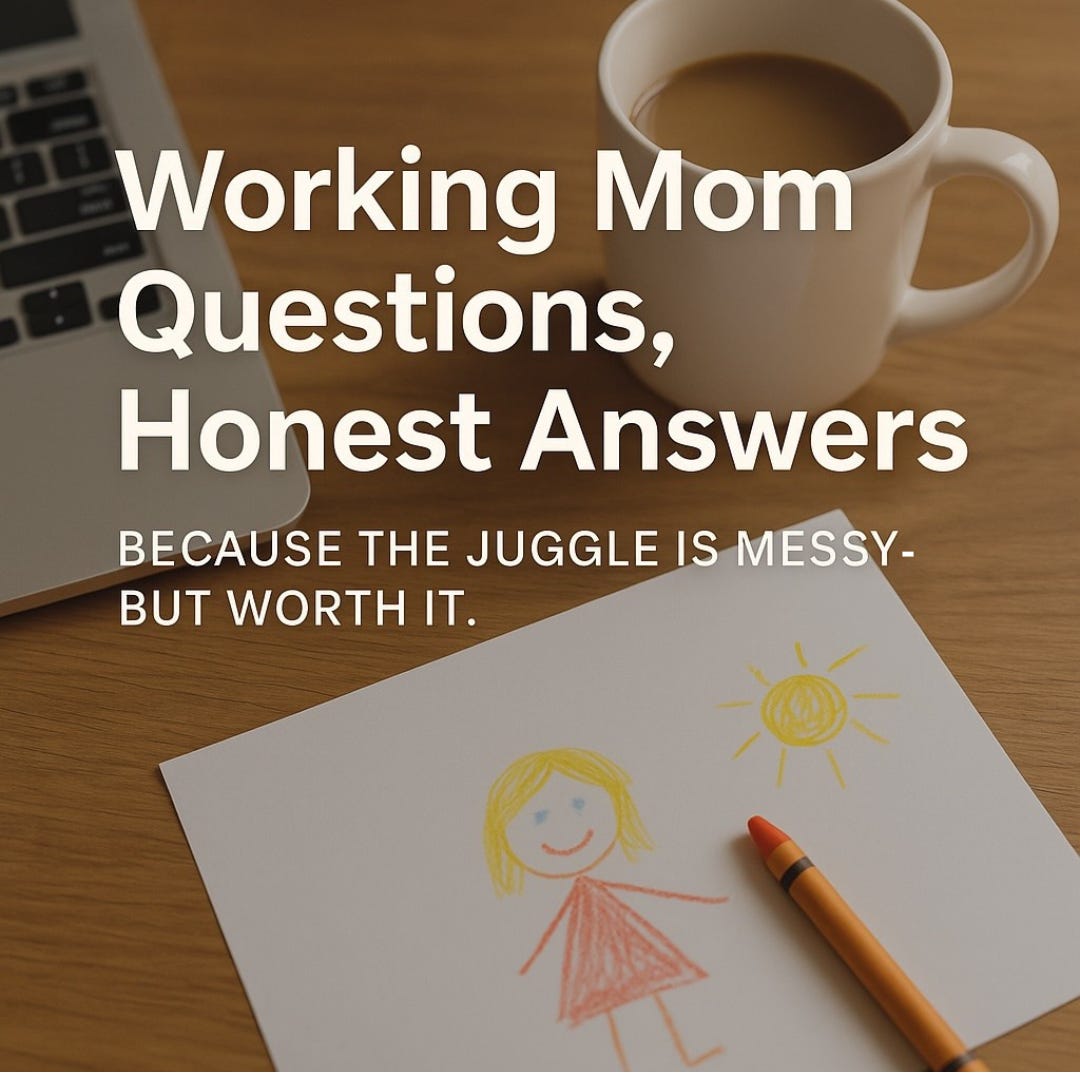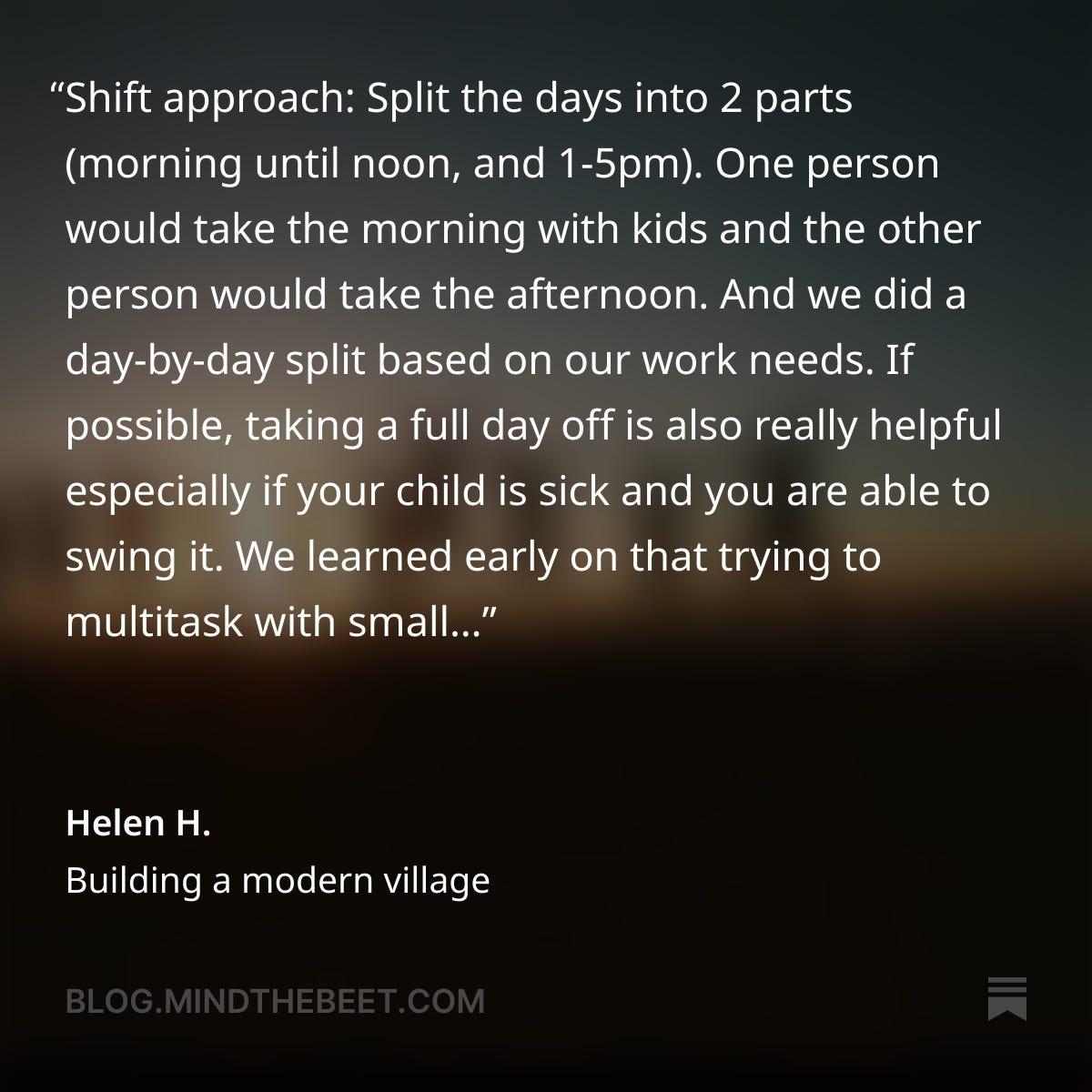Being a working mom isn’t about having perfect timing or achieving a flawless balance. For me, it’s been about making it work—one season, one decision, one messy day at a time. I spent 18+ years in a traditional “corporate” environment and 10+ of those years as a parent.
I have compiled a list of common themes that I wrestled with, shared with women who worked for me and whom I mentored and coached.
If you find this post helpful and you run or are a part of an Employee Resource Group for women or working parents, I would be honored to come speak to your group on this topic.
Building a Foundation at Work
Real talk - I have successfully navigated parenting and working because I have invested in building a high-trust relationship with my manager and team. To achieve this, over the years, I have learned how to communicate effectively and ask for what I need, while maintaining a strong track record of delivering results and demonstrating genuine care for my work, my team, and the company. Because I had this key ingredient, the rest of the journey of balancing pregnancy and returning to work was doable.
Family Planning
Here are the key themes that people ask about: timing of getting pregnant, sharing the news at work, navigating fertility treatment while working full time, and planning maternity leave.
Timing
My timing to start a family was not informed or dictated by my corporate job considerations (promotion timing for example). Because I expect my career to span decades, not years, it was easy to zoom out and understand that whatever short term bumps I’d experience by having kids at an “inconvenient time”, they would even out over the long term.
Instead, the factors that mattered to Adam and me as we contemplated timing were bucket list items that we wanted to accomplish before having kids. Mainly, we wanted to spend a few years being married without having additional responsibilities for other beings (hence we didn’t get a dog either), we wanted to do something epic that would be hard to do with kids, so we climbed Mt. Rainier.
When to share at work that you are pregnant
If you are working in the office, I would find a trusted colleague to share the news with on the earlier side in case you need coverage for meetings because of doctors appointments, etc. I had an office neighbor whom I told about because I needed her to cover an interview, and I was also seen running to the bathroom more often than usual due to morning sickness.
Timing to share with your manager is highly dependent on my original point of having a good relationship with your manager and how much you blend personal life and professional work. I shared early with both of my managers because of the trust and my personality of being open about what’s going on in my life. However, if you would not be comfortable sharing a pregnancy loss or have any concerns about this impacting you at work, then keep the news to yourself until it becomes awkward.
Navigating fertility treatment at work
I have never personally experienced this, but I have had direct reports who have been in this position. As a manager, I deeply appreciated the trust and faith that my direct report had when she shared this information with me and it allowed me to support her. I was able to offer additional resources, as well as step in to cover her work when she needed to be out. I never questioned her commitment—if anything, it gave me more empathy for her full life.
How to transition out to parental leave
Have a strong draft of your transition plan by week 34 and become optional in meetings/projects starting week 36. If your company policy/state laws support it, take the last two weeks before your due date off. Trust me, you do not want to be in the office at 38+ weeks pregnant. Adam also switched his phone ringer to “on” after I hit 36 weeks and assigned me a special ringtone in case I went into labor.
Make sure to inform your manager and team about the type of communication you prefer or don’t want while you are out. For example, I wanted to know if there was going to be a reorganization and I was going to get a new manager, I also wanted to know the results of my annual review.
Returning to work after maternity leave
Having a child is a seismic shift in your life akin to starting college or moving to a new city. When you return to work after something that big, expect things to be different. Also know that what you are going to need will be changing pretty frequently for the first 1-2 years of your life as a parent. But here are a few tips to get you started:
When you return, take a moment to assess what has changed and what has remained the same during your absence. Don’t rush to jump into the tactics on day 1. Give yourself a few days to get acclimated.
Figure out what your schedule needs to look like to support pumping, childcare pick up, etc. My kids went to sleep at 7:30pm for the first year of their life, so if I got home at 6pm, that meant I only saw them for 90 minutes, and that was not going to work for me. So I left work at 4pm but came back online at 8pm.
Make time for yourself - it may feel impossible to prioritize yourself when time at work and at home is going to feel scarce. But savor that cup of coffee alone on your way to work, make a plan to work out, or to periodically go out with a friend.
Here is a longer post I wrote about this - Seven pieces of advice for parents returning to the "office" after parental leave.
Working Mom Life
The key themes here are: what to do when kids get sick, how to manage daytime kid activities when you work 9-5, how to travel for work, and what do you do about morning/evening meetings that inevitably pop up.
Sick kids
Kids get sick. As you prepare for parenthood, take stock of your team culture around this - do people work from home, do many take the full day off, etc. If you are the first person on your team to have a child, discuss with your manager how you will approach and communicate with them when your kids are sick.
When my kids get sick, I go into “calendar crisis mode”: cancel non-urgent meetings, take a breath, and coordinate with my husband on coverage. My husband and I also apply the shift approach:
Also, I want to name that you will need to take time off when your kids get sick unless you have family in town that can cover for you. Day care and schools require 24 hours of being fever free before returning and even most nannies will not come in when your kids are vomiting or have a high fever. I mentally prepare myself for sickness entering the house at the beginning of the school year and during weeks when sickness is most inconvenient.
Daytime conflicts
What happens when your kid is going to be “graduating” from preschool at 1pm on a Tuesday, and it’s 30 minutes away from your workplace? The answer is it depends. If conflicts are planned far enough in advance (2+ weeks), I do my best to clear my calendar and attend. In addition, over the years, I have learned to block parts of certain days so that I can be a mom in moments that matter to me.
First day of school - I block the morning so I don’t rush after drop off. I love having extra connection time with fellow parents and reflecting on the years ahead.
Kids’ birthdays - frankly, that is as much of a celebration of me as it is of them, so if able, I always try to take half a day off for myself.
Halloween - Trick or treating energy is high and we head out around 5/530pm, which means I need to be home no later than 4:30pm. So I plan accordingly.
Work travel
I both love work travel and feel guilty for loving work travel. It’s ok to hold these two conflicting truths. To mitigate, I put in systems that enabled me to travel while knowing that home life was ok. This involved knowing when/how to connect with the kids when I was away, having a plan for when to come back early (if there was sickness), and most importantly, learning how to enjoy the time I had to myself.
Here is a post that gives 10 tips to help minimize “travel guilt.”
Morning/evening meetings
Whether you work across different time zones or deadlines/firedrills creep up, there will be a time when you will need to get on a call in the evening.
For predictable work, such as collaborating with teams in other time zones, I have found success by setting my availability for after-hours calls ahead of time and only having meetings on those evenings. I found doing that 1-2x a week for 1-2 hours was sufficient.
For urgent matters that periodically crept up, parenting taught me to better set boundaries (especially as a leader). I paused and asked questions like “Is this matter really urgent to discuss at 9pm or could it wait until the morning?” If the answer was yes, then I asked if I was critical or if I could send a delegate and catch up by listening to the recording or reading the notes. Sometimes I still have to get on an evening call but I learned to do due diligence and not just say yes.
Summing it up
I decided a long time ago that I wanted to be a working parent. I bring things I learn at work home and vice versa. I firmly believe that doing both helps me live a fulfilling life and brings me the most joy. I also know that this journey is better and easier when you are surrounded by those who are going through the same thing or are slightly ahead of where you are so they can share their path.
If you’re seeking support, I’m running two mentor circles this fall to help parents thrive at work and home and I offer individual coaching for working parents and leaders —drop me a line if you’d like to chat.



